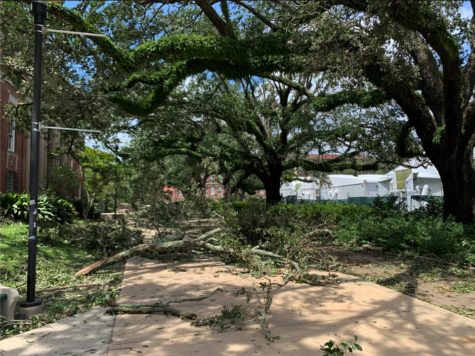
As this year’s hurricane season shapes up to be one of the worst in recent years, Tulane University students and New Orleans residents alike are bracing for the possibility of a destructive few months. With memories of Hurricane Ida not yet forgotten, Tulane prepares for the potential disruption this season may bring. According to an update from the National Oceanic and Atmospheric Administration, there is an 85% chance of an above-normal hurricane season, which lasts from June 1 to Nov. 30 and will reach its peak in the next few weeks. The update predicts that the 2024 hurricane season will see 17-25 named storms, of which eight to 13 will become hurricanes, including four to seven major hurricanes. An average season has 14 named storms, seven hurricanes and three major hurricanes.
The abnormally active season can be attributed to increased activity in the Atlantic Ocean Basin, which frequently affects the Atlantic and Gulf Coast. These conditions, which include warmer-than-average ocean temperatures, reduced vertical wind shear and weaker tropical Atlantic trade winds, have culminated into a potentially destructive hurricane season for the Atlantic Ocean Basin. Another influence on this year’s hurricane season is the end of one of the strongest El Niño periods on record and the transition to La Niña conditions, which further reduces wind shear and is conducive to hurricane development. El Niño and La Niña are natural climate conditions impacting ocean surface temperatures and winds, typically lasting nine to 12 months. These conditions happen every two to seven years, and El Niño suppresses hurricane activity in the Atlantic basin, while La Niña does the opposite, enabling storm development. New Orleans is a part of the Atlantic basin, and although we are currently in an El Niño phase, scientists of the NOAA predict a transition to La Niña soon, which is unwelcome news in terms of hurricane formation and intensity.
Despite an above-normal hurricane season last year, which saw 20 named storms, seven of which were hurricanes and three of which intensified to major hurricanes. Louisiana did not have any severe storms that made landfall, and campus activity did not experience any major weather disruptions.
However, Tulane students and the city of New Orleans have felt the effects of hurricane season in recent years. On Aug. 29, 2021, Hurricane Ida made landfall near Port Fourchon, Louisiana. Ida was one of the most destructive and powerful hurricanes in the state’s history, second only to Katrina. According to an announcement made by Tulane on Aug. 28, 2021, a shelter-in-place plan had been enacted. This is because the city of New Orleans had not ordered an evacuation, and thus Tulane was sheltering students in place and planning to supply food and water for a three-day period in accordance with tropical storm emergency protocols. Students could self-evacuate.
However, on Aug. 31 and Sept. 1, any remaining students on campus were evacuated by bus to Houston. Tulane canceled classes for two weeks, and class resumed online on Sept. 13. Students returned to a fully functioning campus on Sept. 30, two weeks earlier than expected.
Students can expect a similar response protocol in the case of a hurricane this year. Tulane’s Office of Emergency Preparedness and Response recently reminded students via email to develop a personal evacuation plan and update their Student Evacuation Plan in Gibson. The Office of Emergency Preparedness and Response has an extensive policy in the case of hurricanes and severe storms, which states that should students evacuate with Tulane, they will have up to three days to establish “where they will relocate to and implement their post-evacuation plan.”
Abigail Wile, a sophomore from Austin, says the abnormal hurricane season was the ultimate factor when deciding whether to bring a car this year.
“My personal evacuation plan is to hopefully hear about the hurricane early enough so I can drive home,” said Wile. “It makes me so scared. Recently, my family in Houston had to evacuate, so my family is really worried about New Orleans.”
As we approach the peak of hurricane season, preparation and caution will be key. With potentially severe storms in the forecast and lessons from Ida in hindsight, the Tulane community will hopefully be well-prepared for what could be a challenging season.


